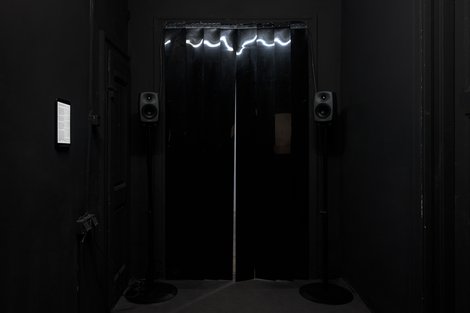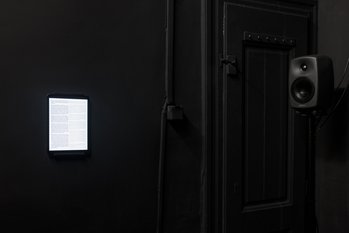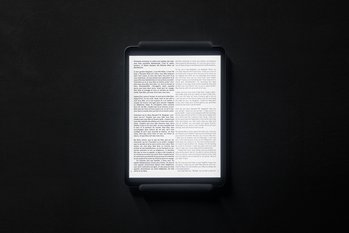They Leave Their Little Ones There / KINO MANHATTAN
Mohamad Abdouni
Mohamad Abdouni
GIANNI MANHATTAN is pleased to present "They Leave Their Little Ones There", Mohamad Abdouni's audiovisual installation comprised of two digitized findings from the artist’s family archives—one an audio recording from a cassette tape, the other an 8mm silent film reel.
Mohamad Abdouni, All the Birds, 2024
Video, 1969
Words by Julia Sabra from the album Snakeskin (with Fadi Tabbal), 2022
Courtesy of the artist and Marfa’, Beirut
An uncovered 8mm film reel from the artist's family archives, dating back to 1969 and shot in the Beqaa Valley of Lebanon, where Abdouni is from. The footage captures a hunting trip—an intergenerational male ritual where fathers, uncles, and children gather, rifles in hand, enacting a rite of passage passed down through generations.
The artist watches from the margins, drawn to the spectacle yet never fully embraced by it, or by the men who populated his childhood. Revisiting this footage, he reinhabits the queer kid he once was, observing moments of male camaraderie that feel at once intimate and alienating—gestures of authority masked as tenderness, dominance disguised as play.
Superimposed onto the film, the lyrics from Julia Sabra’s All the Birds introduce a quiet tension, echoing the artist’s sense of exclusion. Phrases like "Nothing grows here anymore" punctuate the imagery, expanding the work beyond personal memory to evoke broader themes of disconnection, estrangement, and the cyclical nature of inherited identities.
The work continues Abdouni’s exploration of masculinity, tracing the weight of its performance. He crafts a portrait of a past that shaped him by keeping him at its periphery—one he neither fully belonged to nor entirely rejected.
Mohamad Abdouni, All the Birds, 2024
Video, 1969
Words by Julia Sabra from the album Snakeskin (with Fadi Tabbal), 2022
Courtesy of the artist and Marfa’, Beirut
An uncovered 8mm film reel from the artist's family archives, dating back to 1969 and shot in the Beqaa Valley of Lebanon, where Abdouni is from. The footage captures a hunting trip—an intergenerational male ritual where fathers, uncles, and children gather, rifles in hand, enacting a rite of passage passed down through generations.
The artist watches from the margins, drawn to the spectacle yet never fully embraced by it, or by the men who populated his childhood. Revisiting this footage, he reinhabits the queer kid he once was, observing moments of male camaraderie that feel at once intimate and alienating—gestures of authority masked as tenderness, dominance disguised as play.
Superimposed onto the film, the lyrics from Julia Sabra’s All the Birds introduce a quiet tension, echoing the artist’s sense of exclusion. Phrases like "Nothing grows here anymore" punctuate the imagery, expanding the work beyond personal memory to evoke broader themes of disconnection, estrangement, and the cyclical nature of inherited identities.
The work continues Abdouni’s exploration of masculinity, tracing the weight of its performance. He crafts a portrait of a past that shaped him by keeping him at its periphery—one he neither fully belonged to nor entirely rejected.

6.03.25—19.04.25
GIANNI MANHATTAN, Wassergasse 14, 1030 Vienna
> Installation views
GIANNI MANHATTAN is pleased to present "They Leave Their Little Ones There", Mohamad Abdouni's audiovisual installation comprised of two digitized findings from the artist’s family archives—one an audio recording from a cassette tape, the other an 8mm silent film reel.
Mohamad Abdouni, All the Birds, 2024
Video, 1969
Words by Julia Sabra from the album Snakeskin (with Fadi Tabbal), 2022
Courtesy of the artist and Marfa’, Beirut
An uncovered 8mm film reel from the artist's family archives, dating back to 1969 and shot in the Beqaa Valley of Lebanon, where Abdouni is from. The footage captures a hunting trip—an intergenerational male ritual where fathers, uncles, and children gather, rifles in hand, enacting a rite of passage passed down through generations.
The artist watches from the margins, drawn to the spectacle yet never fully embraced by it, or by the men who populated his childhood. Revisiting this footage, he reinhabits the queer kid he once was, observing moments of male camaraderie that feel at once intimate and alienating—gestures of authority masked as tenderness, dominance disguised as play.
Superimposed onto the film, the lyrics from Julia Sabra’s All the Birds introduce a quiet tension, echoing the artist’s sense of exclusion. Phrases like "Nothing grows here anymore" punctuate the imagery, expanding the work beyond personal memory to evoke broader themes of disconnection, estrangement, and the cyclical nature of inherited identities.
The work continues Abdouni’s exploration of masculinity, tracing the weight of its performance. He crafts a portrait of a past that shaped him by keeping him at its periphery—one he neither fully belonged to nor entirely rejected.
Mohamad Abdouni, All the Birds, 2024
Video, 1969
Words by Julia Sabra from the album Snakeskin (with Fadi Tabbal), 2022
Courtesy of the artist and Marfa’, Beirut
An uncovered 8mm film reel from the artist's family archives, dating back to 1969 and shot in the Beqaa Valley of Lebanon, where Abdouni is from. The footage captures a hunting trip—an intergenerational male ritual where fathers, uncles, and children gather, rifles in hand, enacting a rite of passage passed down through generations.
The artist watches from the margins, drawn to the spectacle yet never fully embraced by it, or by the men who populated his childhood. Revisiting this footage, he reinhabits the queer kid he once was, observing moments of male camaraderie that feel at once intimate and alienating—gestures of authority masked as tenderness, dominance disguised as play.
Superimposed onto the film, the lyrics from Julia Sabra’s All the Birds introduce a quiet tension, echoing the artist’s sense of exclusion. Phrases like "Nothing grows here anymore" punctuate the imagery, expanding the work beyond personal memory to evoke broader themes of disconnection, estrangement, and the cyclical nature of inherited identities.
The work continues Abdouni’s exploration of masculinity, tracing the weight of its performance. He crafts a portrait of a past that shaped him by keeping him at its periphery—one he neither fully belonged to nor entirely rejected.
Mohamad Abdouni, Letter from Aisha, 2024
Audio, 1989
Courtesy of the artist and Marfa’, Beirut
During the Lebanese civil war (1975–1990), many of the artist’s aunts, uncles, and other family members fled to Brazil. His grandmother, who was illiterate, sent letters to her children in the form of recorded cassette tapes.
On this particular tape, sent months after the artist’s birth, she addresses her children in Brazil—describing the everyday realities of war, its repercussions on life in the countryside, inquiring about her grandchildren, dispensing unsolicited marital advice, and recounting anecdotes from the lives of her neighbors.
Audio, 1989
Courtesy of the artist and Marfa’, Beirut
During the Lebanese civil war (1975–1990), many of the artist’s aunts, uncles, and other family members fled to Brazil. His grandmother, who was illiterate, sent letters to her children in the form of recorded cassette tapes.
On this particular tape, sent months after the artist’s birth, she addresses her children in Brazil—describing the everyday realities of war, its repercussions on life in the countryside, inquiring about her grandchildren, dispensing unsolicited marital advice, and recounting anecdotes from the lives of her neighbors.


